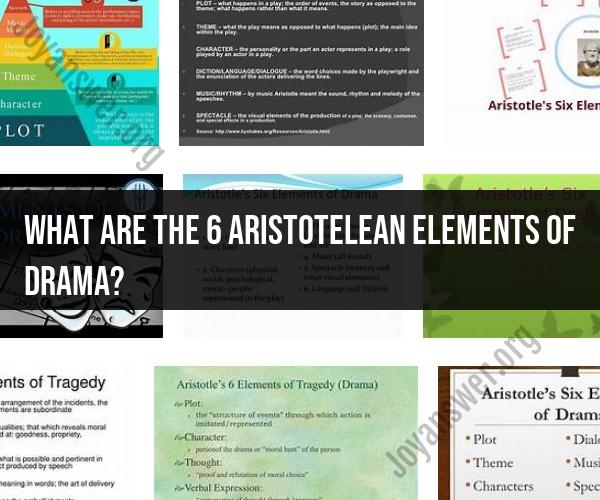What are the 6 Aristotelean elements of drama?
Aristotle, the ancient Greek philosopher, provided a foundational framework for understanding drama. He identified six essential elements that contribute to the structure and impact of a theatrical work. Let's delve into the Aristotelian elements of drama and their significance:
1. Plot
The plot is the sequence of events that comprise the story. Aristotle considered it the most important element, as it drives the narrative forward and engages the audience's emotions. A well-structured plot features a beginning, middle, and end, with a cause-and-effect chain that creates tension and resolution.
2. Character
Character refers to the individuals who populate the story. Their personalities, motivations, and interactions contribute to the unfolding of the plot. Well-developed characters evoke empathy and connection, making the audience invested in their fates.
3. Thought
Thought, also known as dianoia, encompasses the ideas, themes, and intellectual aspects of the drama. It includes the moral and ethical dilemmas presented, as well as the philosophical concepts explored. Thought enriches the narrative by prompting reflection and contemplation.
4. Diction
Diction refers to the language and dialogue used by characters. The choice of words, style, and expression influences the tone and atmosphere of the play. Effective diction conveys emotion, conveys character traits, and enhances the audience's understanding of the story.
5. Song
Song encompasses the musical and rhythmic elements of a drama. In ancient Greek theater, song was an integral part, often performed by the chorus. It adds a lyrical dimension to the narrative, heightening emotions and contributing to the overall sensory experience.
6. Spectacle
Spectacle refers to the visual and sensory aspects of the performance, including costumes, scenery, and special effects. While Aristotle considered spectacle the least important element, it still plays a role in enhancing the audience's engagement and creating a memorable experience.
Conclusion
The Aristotelian elements of drama provide a comprehensive framework for analyzing theatrical structure. By examining the interplay of plot, character, thought, diction, song, and spectacle, audiences and creators can gain a deeper appreciation of the complexities and nuances of dramatic storytelling.






